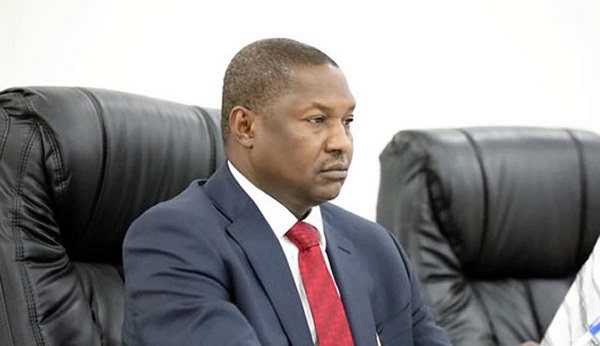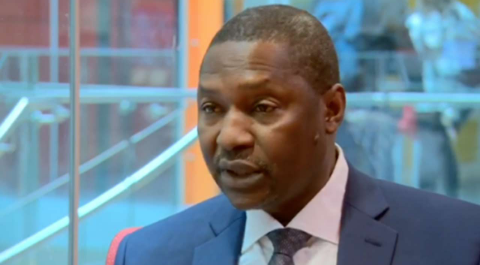Reprieve for Malami, Amaechi, others as court voids Section 84(12) of Electoral Act
•Orders Malami to remove provision barring appointees from contesting elections •AGF promises prompt execution of judgment on Electoral Act •Senate unaware of court ruling, says spokesman •Reps: Our intentions were noble
By Sunny NWANKWO, Umuahia / Tony AKOWE/Eric IKHILAE, Abuja On Mar 19, 2022
Share
POLITICAL appointees yesterday got the nod to vote as delegates or be voted for at their party’s convention or congress after a Federal High Court sitting in Umuahia, Abia State voided the controversial Section 84 (12) of the Electoral Act.
Justice Evelyn Anyadike ordered the Attorney General of the Federation to delete the section from the Electoral Act forthwith.
And the AGF and Justice Minister Abubakar Malami (SAN), who is one of the people believed to have been the targets of the Section, promised last night that the judgment would be promptly executed.
The ruling came 10 days after the Senate rejected a bill to amend the section as earlier requested by President Muhammadu Buhari.
The Red Chamber of the National Assembly said yesterday that it was yet to be served with details of the court case while the House of Representatives said the intention of the National Assembly in including the provision in the Act was aimed at giving all those who want to take part in the electoral process a level playing ground.
The contentious section stipulates that “No political appointee at any level shall be a voting delegate or be voted for at the convention or congress of any political party for the purpose of the nomination of candidates for any election.”
Justice Anyadike, ruling yesterday in a suit filed by a lawyer in Abia State, Nduka Edede, said the section ought to be struck down as it cannot stand when it is in violation of the clear provisions of the Constitution.
She said Sections 66(1)(f), 107(1)(f), 137(1)(f) and 182(1)(f) of the 1999 Constitution already stipulate that people employed in the public service of the federal or state government seeking to contest elections should resign at least 30 days to the date of the election.
The court said any other law requiring such appointees to resign or leave office at any time other than what the constitution stipulates is unconstitutional and invalid.
Counsel to the Plaintiff Emeka Ozoani (SAN) told reporters moments after the court ruling that the National Assembly was no longer required to amend the section as the import of the judgment is that Section 84(12) of the Electoral Act does not exist.
He said: “The court has just agreed with our submission that Section 84 (12) of the Electoral Act is inconsistent with the rights of Nigerian citizens when read with sections 66, 107, 137, and 182 of the Constitution and now nullified section 84(12) of the Electoral Act.
“The court has equally ordered the Attorney General of the Federation, Abubakar Malami, to delete section 84(12) of the Electoral Act forthwith.
“The implication of this is that it has provided a congenial atmosphere for politicking and political space for 2023 and it is a welcome development.
“Those who said that the National Assembly should go and amend Section 84(12) of the Electoral Act should know that you can’t amend illegality.
“An unconstitutional statue cannot be amended by same body.
“So, the proper order that the court has made represents the law and we commend the court as well.”
Also reacting, representative of the Attorney-General of the Federation, Chris Nevo, hoped that the National Assembly “will now go back and do the right thing since the court has made pronouncement on it and put to rest every other issue with regards to Section 84(12) of the Electoral Act.
“We can now move on with other national issues that are besieging us as a country and nation. Now that the court has ruled on the matter, it is for the National Assembly to delete and we move on.”
The plaintiff, Nduka Edede of Action Alliance, approached the court last week, praying it to strike out the section which he said was inconsistent with the provisions of the 1999 Constitution.
Malami promises prompt execution of judgment on Electoral Act
Justice Minister Abubakar Malami said last night that the judgment would be expeditiously executed.
Malami’s media aide, Dr. Umar Gwandu, in a statement said: “The office of the Attorney General of the Federation and Minister of Justice will accordingly give effect to the court judgment in line with the dictates of the law and the spirit of the judgment.
“The judgment of the court will be recognized by the Government printers in printing the Electoral Act.
“The Act will be gazetted factoring the effect of the judgment into consideration and deleting the constitutionally offensive provision accordingly.
“The provision of Section 84(12) of the Electoral Act 2022 is not part of our law and will be so treated accordingly.
“This is in line with the dictates of chapter 7, Part 4, Section 287 of the 1999 Constitution of the Federal Republic of Nigeria (as amended) on enforcement of decisions that makes it a point of duty and obligation on all authorities and persons to have the judgment of the federal High Court, among others, to be enforced.”
Observers said yesterday that the judgment paves the way for the likes of Malami, Transportation Minister Rotimi Amaechi and other political appointees who want to seek elective offices next year.
Why Senate can’t react to court ruling now —Spokesman
Contacted yesterday to react to the court ruling, Chairman, Senate Committee on Media and Public Affairs, Senator Ajibola Basiru, declined comments, saying he could not give an opinion based on media reports.
His words: “I’m not aware of the suit and whether the National Assembly was a party or was served and/or represented.
“I have also not seen or read the judgment or whether the National Assembly has been served with the judgment or any order of court.
“I cannot react to newspaper reports of court judgment without seeing the actual court judgment.”
Our intention on section 84(12) noble, says House of Reps
The House of Representatives said yesterday that its motive for introducing section 84(12) which requires political appointees to resign their position before participating in party convention and congresses as delegates to vote and be voted for was noble and aimed at creating a level playing ground for all Nigerians.
It however said it would await the certified true copy of the judgement of the Federal High Court on section 84(12) before making an informed comment on the judgment.
Spokesman of the House, Rep. Benjamin Kalu said the intention of the National Assembly in including the provision in the Act was aimed at giving all those who want to take part in the electoral process a level playing ground.
He said the section complained about has nothing to do with public servants referred to in the constitution but appointees of government at all levels, pointing out that while the constitution referred to civil servants, the Electoral Act deals with politicians and political appointees.
He said: “The judgment of the Federal High Court has raised a couple of issues. Let me say that the House of Representatives is not aware of this legal matter and is still not aware whether we were necessary party to this matter or not.
“It is important to note that it is out of place to comment on a judgement we are yet to see the certified true copy. So, we will make comment on this judgment once we receive the certified true copy of the judgment to know the length and breadth of the judgment.
“We have read from the media that the judgment borders on section 84(12) of the Electoral Act amendment bill which Mr. President signed into law recently and for which Mr. President has communicated the National Assembly, i.e. the Senate and the House of Representatives.
“As you are aware, the Senate has treated the letter by voting on a motion moved on it while the House of Representatives is still waiting for legal opinion from the legal department that is currently looking at the issues raised by Mr. President in that letter before debating it. That was before we heard of this letter.
“When we get the CTC, we will like to know who represented us, who served us and all those technicalities. It is important to let Nigerians know the mindset of the legislature, the intention of the legislature while drafting section 84(12) bothers on our intention to have an excellent electoral reform.
“As you know, for electoral reform to be effective, it has to be transparent, it has to be accountable, it has to be as inclusive as possible, it has to be as competitive as possible and it has to be fair for it to be credible. If any of these ingredients is missing at any point towards achieving credible election, it will affect the whole picture.
“That is why we wanted to address the conduct of appointed officers who are appointees of political office holders, who are used as tools during conventions and congresses and being part of the body that determine who becomes a candidate in the general election or who will not be a candidate in the general election.
“It is important that how that process is conducted is considered to enable us have a credible process that will be above board.
“We wanted to give a level playing ground for those who have been in government and are not supposed to use the undue advantage of being in government while running for office, especially in political party administration so that they will be at par with those who are not occupying any office so that they will be at par to run for office.
“It has nothing to do with public servants. I say this because I heard that many have argued that it offends the provisions of the constitution with regards to section 66, and a couple of other provisions that border on how to be qualified or to be disqualified for an election, especially the section that talks about 30 days withdrawal before election.
“That is for public servants. We are talking about political appointees. Section 318 defines who a public servant is, and that does not include political appointees. The ability to distinguish between these two will help us understand what the electoral act is trying to do as against what is being roped in as trying to do at the moment and that it is offensive to the constitution.
“When we get that judgement, we will know whether that differentiation was clear or was not clear. Who is the public servant that is referred to in the various provisions that was relied on in taking this decision? Who are the political appointees referred to?
“The Electoral Act addressed political appointees while the constitution addresses public servants. We have to get the judgement to know if this was clearly demarcated or not. That will help us understand the position from where the judgement was given and the next step to take.”
Only last week, the Senate, in a voice vote, rejected a bill seeking to expunge the section from the Act.
The bill was in response to a request by President Buhari who, while signing the bill into law on February 25, had complained that the clause was a fundamental defect as it was in conflict with extant constitutional provisions.
According to him, section 84 (12) constitutes a disenfranchisement of serving political office holders from voting or being voted for at conventions or congresses of any political party.
This, he said, was for the purpose of the nomination of candidates for any election in cases where it holds earlier than 30 days to the national election.
He argued that the provision introduced qualification and disqualification criteria that ultra vires the Constitution by way of importing blanket restriction and disqualification.
This, he said, was basically for serving political office holders of which they were constitutionally accorded protection.
He said in a follow up letter to the National Assembly that “it is imperative to note that the only constitutional expectation placed on serving political office holders that qualify by extension as public officers within the context of the constitution is resignation.
Others, he said, were withdrawal or retirement at least 30 days before the date of the election.
“Hence, it will be stretching things beyond the constitutional limit to import extraneous restriction into the constitution on account of practical application of section 84(12) of the bill,” he said.
Following the rejection of the amendment bill, the Attorney General of the Federation and Justice Minister Abubakar Malami (SAN) had said the Federal Government would consider all other options available to it before taking a position.
In rejecting the bill, the Senate relied on Rule 52(5) of the Senate Standing Order which provides thus: “Reference shall not be made to any matter on which a judicial decision is pending, in such a way as might in the opinion of the President of the Senate prejudice the interest of parties thereto.”
Senator Adamu Aliero (Kebbi Central) asked the Red Chamber to step down consideration of the bill pending the vacation of an order made by the Federal High Court, Abuja.











